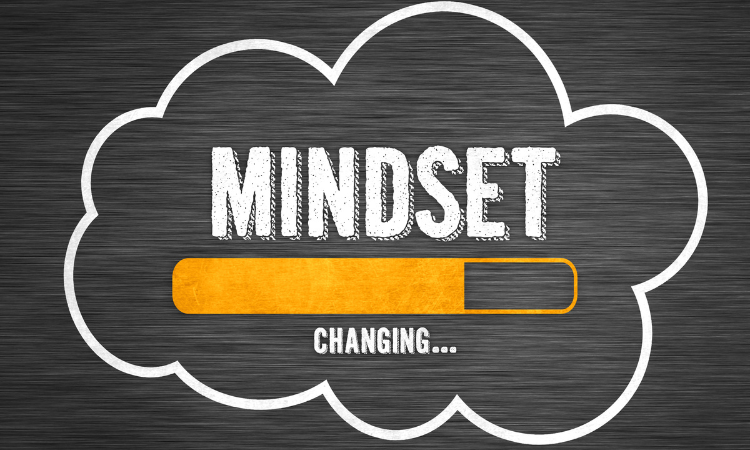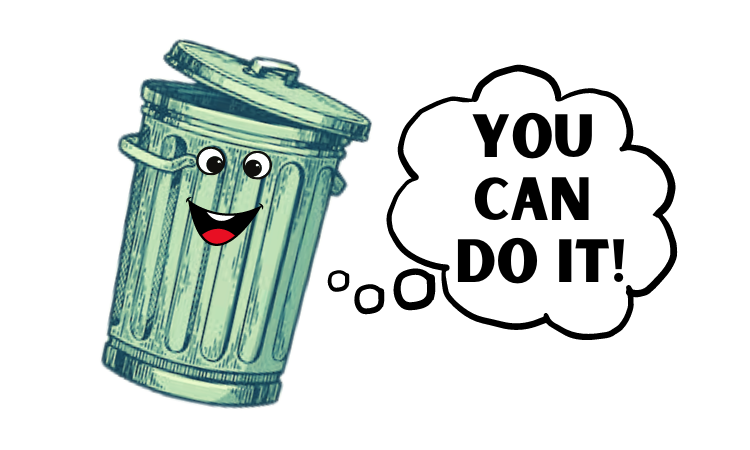This One Mindset Shift Will Change How You Think About Sustainability

I have a little secret for you. There's a big lie when it comes to sustainability.
I've been working in the sustainability space for over 10 years now. My love has always been around waste. When I first started in the space, there was this belief that you had to go all in on sustainability. Even if that wasn't true, many educators, content creators and influencers tried to convince people to be "zero" on all things sustainable.
(I'll do a post soon on why I hate the term "zero waste.")
There was this idea that you had to buy things to be sustainable, including to-go bamboo silverware (which is terrible by the way), new cups, and all of the newest gadgets.
You should see my face right now. It is glaring at those people.
THIS IS A LIE!
The truth is - you don't need to buy anything to be sustainable.
The truth is - you don't have to be perfectly zero at anything.
The truth is - you only have to shift your mindset around sustainable living to adapt habits that fit within your lifestyle.
YOUR LIFESTYLE!
Sustainable living is about your own personal journey. It's not for anyone else to tell you how to do it. There are a million (maybe even a gazillion) ways to be sustainable. It can be something as simple as taking your grocery bag to the store all the way to baking your own bread at home. It can be choosing a glass bottle over a single-use plastic one. It can be making sure you properly recycle your items to talking to your City Council person about adopting waste policy.
"It is YOUR JOURNEY into sustainable living ..."
"It is YOUR JOURNEY into sustainable living or I like to call it an eco-lifestyle.
Anyone CAN do this - Yes, even YOU!"
But how you ask?
It starts with being perfectly imperfect. We currently live in a society designed to be wasteful. From our single-use plastics, lack of infrastructure, marketing efforts, and manufacturing laws, materials are designed to be used once and tossed into the trash. (History lessons coming soon.) This is called a linear economy.

I want you to know that there will be days when you create waste because it’s unavoidable and days when you can minimize your waste. There will be a lot of in-between. All the days are OK.
What matters is that you are aware and trying to improve. Again, shifting your mindset.
It’s about asking yourself questions:
Do I NEED to buy this? Can I refuse it?
Is there something I can use instead that I already own?
Is there another reusable option?
Can I borrow it?
If I do buy it, how long will I keep it?
Once I’m done with it, can it be properly disposed of?
Will it bring me joy? (thanks Marie Kondo!)
These are just a few. The idea is to slow down your purchases and think before you make an impulse buy. It’s about not buying into the marketing hype. Yes, marketing makes us believe we need to buy now or invest in the latest, coolest, hippest trend. Guess what - you don’t! One of the most powerful things you can do as a consumer is to step back and ask yourself - DO I NEED THIS?
As adults, we tend to lose our creativity. We need easy and quick solutions, which usually mean going out to buy. What if there is a solution right in front of us? What if we could take a moment to ask ourselves: Do we need to buy this item?
The overall goal of this mindset shift is to understand your actions (aka your eco-actions) and how they impact the world around you each day. It's about seeing where you can minimize your waste and make slight changes that are better for the environment. Each day, you make choices. Those choices have an impact on the environment. Each day you can decide how to show up to do something better for the planet. It doesn’t have to be perfect. It doesn’t have to be a grand gesture; it doesn’t have to be complicated or time-consuming.
It's about asking yourself this little question every day ....
"What CAN I do today that is a little better for our Earth?"

Let's Talk Easy as 1-2-3 Sustainable Living
Now that you understand about mindset shift when it comes to sustainability, let’s talk about eco-action steps you can take to live a more sustainable lifestyle. Remember, these steps are meant to fit into your life, not someone else’s ideal, perfect zero-waste world.
Start With What You Have: Before you go out and buy anything new, take a look at what you already own. Can you repurpose, reuse, or upcycle something instead of replacing it? For example, glass jars can be used for storage, old clothes can be turned into cleaning rags, and leftover food can be composted.
Simplify Your Routine: Sustainable living doesn’t have to be complicated. Start by simplifying your routine. Bring reusable bags when you go shopping, carry a refillable water bottle, and opt for products with minimal packaging.
Mindful Consumption: Before making a purchase, ask yourself if you really need it. Can you borrow, rent, or buy second-hand instead? When you do buy something, choose quality over quantity. A well-made item that lasts longer is more sustainable than a cheap, disposable one.
Reduce Food Waste: Plan your meals, use leftovers creatively, and compost food scraps. Reducing food waste is one of the most impactful things you can do for the environment.
Advocate for Change: Sustainable living isn’t just about individual actions; it’s also about advocating for systemic change. Get involved in your community, support policies that promote sustainability, and use your voice to push for a better, more sustainable future.
Educate Yourself and Others: The more you learn about sustainability, the better equipped you’ll be to make informed choices. Share your knowledge with others and encourage them to join you on this journey.
Embrace Slow Living: Slow down and savor the process of living sustainably. Whether it’s growing your own food, cooking from scratch, or mending clothes, take the time to enjoy these activities. They’re not just good for the planet—they’re good for your soul too.
Be Patient and Kind to Yourself: Change takes time, and sustainable living is a journey, not a destination. Be patient with yourself, celebrate your successes, and learn from your mistakes.
Don’t be perfect: Remember that the system is designed to make living an eco-lifestyle more challenging. Don’t try to be perfect.
Try, Try and Keep Trying: If you have a day where you use all single-use plastic, that’s OK! Try again tomorrow. Remind yourself to pack your reusables or think of ways you can refuse and reduce!
At the end of the day, sustainable living is about what works for you. It’s your journey into your eco-lifestyle. And guess what?
Anyone CAN do this. Yes, even you!
Need a little help? Grab my free guide on "How to Trash Talk Like a Pro" that provides insights into
You don’t have to be perfect. You don’t have to follow someone else’s rules. You just have to start where you are, with what you have, and take it one step at a time.
So, what’s the takeaway here?
The truth about sustainability is that it’s not about being “zero” at anything. It’s not about buying the latest eco-gadgets or achieving perfection. It’s about shifting your mindset, embracing imperfection, and making choices that align with your values and lifestyle.
Sustainable living is a personal journey, and it’s up to you to define what that means. There’s no one right way to do it. The important thing is that you’re aware, you’re trying, and you’re making progress. And that, my friend, is more than enough.
Final Thoughts
In a world that often demands perfection, it’s liberating to know that eco-living doesn’t require it. You don’t have to be zero waste, zero carbon, or zero anything to make a difference. You just have to be willing to try, learn, and grow.
So the next time someone tells you that you need to buy something to be sustainable or that you need to be perfect, just smile and remember the truth:
eco-living is about progress, not perfection.
And let them know ProTrash Talker taught you that! :)
Remeber - It’s about your journey and the impact on the world. It's about living within your means and doing the best you CAN to make a difference.
Let’s move forward, imperfectly but intentionally, on this path to a more sustainable future. And let’s do it together, one piece of trash at a time!
What small changes CAN you make today for a better tomorrow?
I know you CAN!